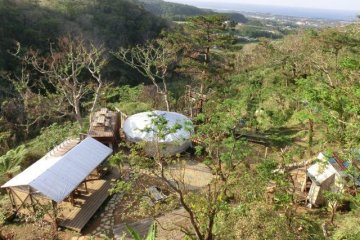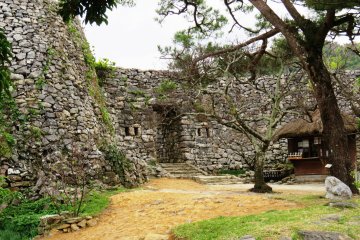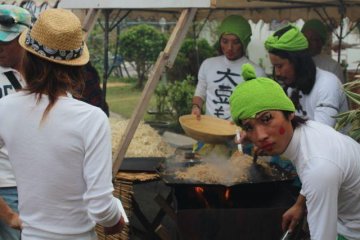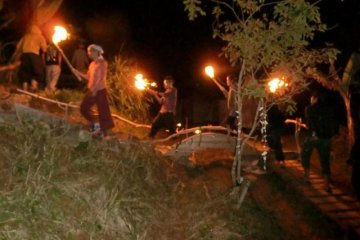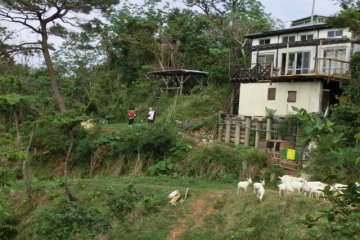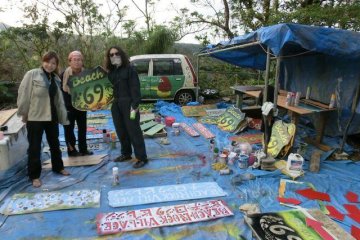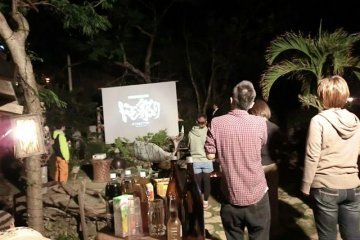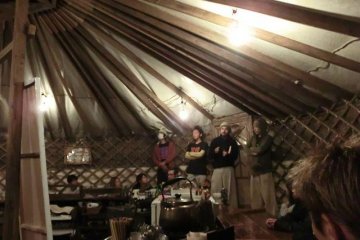Before you get too excited about the prospect of living for a month or more rent-free on beautiful Okinawa, Japan's Hawaiian gem in the sub-tropical south, let me just outline an average day-in-the-life of a volunteer staff at Beach Rock Village, an island all its own up in the jungle of Nakijin.
Wake up in a tent, slightly soggy from the tempest that blew in through the night, at 6 am. You didn't set your alarm until 6:30 am, however your neighbor, a mere 3 feet away in the next tent over is a hard sleeper and likes to hit the snooze button lackadaisically for thirty minutes. Why so early? Well, since you are helping re-build the roof on a tree house, and the rain makes it a wee bit too slippery six meters up in a pine tree, you generously volunteered your morning time to help Food Production cut a truckload of nepia grass for the 15 horses next door instead. This has to be done on a daily basis, a task that typically takes 4 people most of the morning to accomplish.
You stumble out of your tent, startle the 4 dogs who start with their own barking alarm and clog your way down the slippery boardwalk to the toilet. Thankfully there isn't a wait and you can handle your business in a timely fashion. And since the mizu-gumi or water team remembered to fill the tank last night, you can actually flush the toilet and wash your face.
Climb the steep steps to the staff room and change into sagyo-fuku work clothes and rubber boots; careful not to forget a pair of gloves. The smell of toast and jam and sanpin-cha (jasmine tea) fill the air and grumble your stomach. Not to worry though, as you trundle out of the jungle compound in the rusty, rickety old Beach Rock hippy van bouncing over potholes and boulders with your sleepy-eyed cohorts, you can try and put down a bit of breakfast before work.
Maybe today is a lucky day in the life of Team Nepia, and thus you end up on Kouri-jima, a small island connected by a 2 km long low-bridge over turquoise water, highlighting your tall grass cutting labor with excellent early morning views. Proceed, kama scythe in hand, to slice the thick stalks at the roots, stacking for at least an hour, then heaving and hauling your piles to the truck bed, thinking all the while how very happy the horses will be to get the fresh greens full of vitamins and minerals.
You get back to the village in time for a little carpentry meeting before lunch. Scarf down some udon stew with welsh onion trimmings from the garden and a mustard green salad. Turns out that after lunch you will be wearing a strawberry hat and answering riddles provided to teams of 3-Day Adventure guests, as you cut and grind wood in order to assemble an o-mikoshi festival float for the party tomorrow night. This and other tasks keep you busy until sunset, then you take a quick shower thankful to have hot water, go help fill up the water tank and get back in time to fold some clean work clothes just before dinner. Tonight is tuna steak, again, leftover from the BBQ event two days ago. After dinner at 8 pm is the daily meeting, a round-table affair in the Yurt Cafe/Bar where everyone is brought up to date on the work being done, questions and concerns fielded, announcements made, and general speeches of excitement and enthusiasm punctuated by exclamations of "Otsukaresama! Good work!" and other verbal team spirit building and pats on the back.
Those who are still "genki" at this point can kick back in the bar and drink as much local Awamori (rice liquor) as they want; the local brew is nightly "nomi-hodai" or all-you-can-drink. Around 1 am you tear yourself away from amusing conversation with Masa the veteran bartender and call it a night, stumbling back to your tent as you stumbled out at 6 in the morning. Wait, what's that funny smell? You seem to have left a piece of candy and choco-pie in your tent for "later" and it seems a rat has chewed a hole to get in through the rain fly and scarf down half your treats first. So, after cleaning up the poop it so kindly left on your sleeping mat and duct-taping the hole, you curl up in sleeping bag and catch some Zzz.
So, if I haven't scared you away with an average day as volunteer staff at Beach Rock Village, by all means, sign up to help cook staff meals and clean the cottage, tipis and tipas as a Guesthouse staff. Or if you fancy cutting firewood and making dough in the morning to prepare brick-oven pizza, taking drink orders and climbing a ladder one-handed up to the Tree Terrace while balancing 4 Cafe Au Laits on a tray, join the Cafe/Bar team. If getting sunburnt and playing in the dirt, composting and planting strikes your fancy help out with Food Production. As main staff and time allows, there is also the possibility of firing ceramics in a mud oven, repairing tree houses, general village maintenance and beautification, sign-making and repair, etc. Just ask!
Everyone also gets to help tend the animals next door at Mumin Boku-jo once a week, as well as a small team filling up the water tank daily. More than your ordinary working holiday, the village offers you a personal insight into a real-life experiment at sustainable living in a gorgeous yet wild place. The make-shift revolving community members add to the dynamic making everyone's experience there totally unique and different than anyone else's before or previous. And as with any community of its kind, there may be difficulties and problems and tensions may rise as heated arguments ensue. A conscious attempt at democracy, the round table meetings provide open forum to voice opinions and express oneself accordingly so that ideally as brothers and sisters you can work it out and continue to enjoy your time and function well together as a team.
Unfortunately the Beach Rock website only has their volunteer staff Help Wanted info in Japanese at the moment. Though if you contacted them directly with a simple, friendly email inquiring about current opportunities, I am sure they would be happy to hear from you and get back ASAP.
Good luck and "Otsukarasama desu!"



